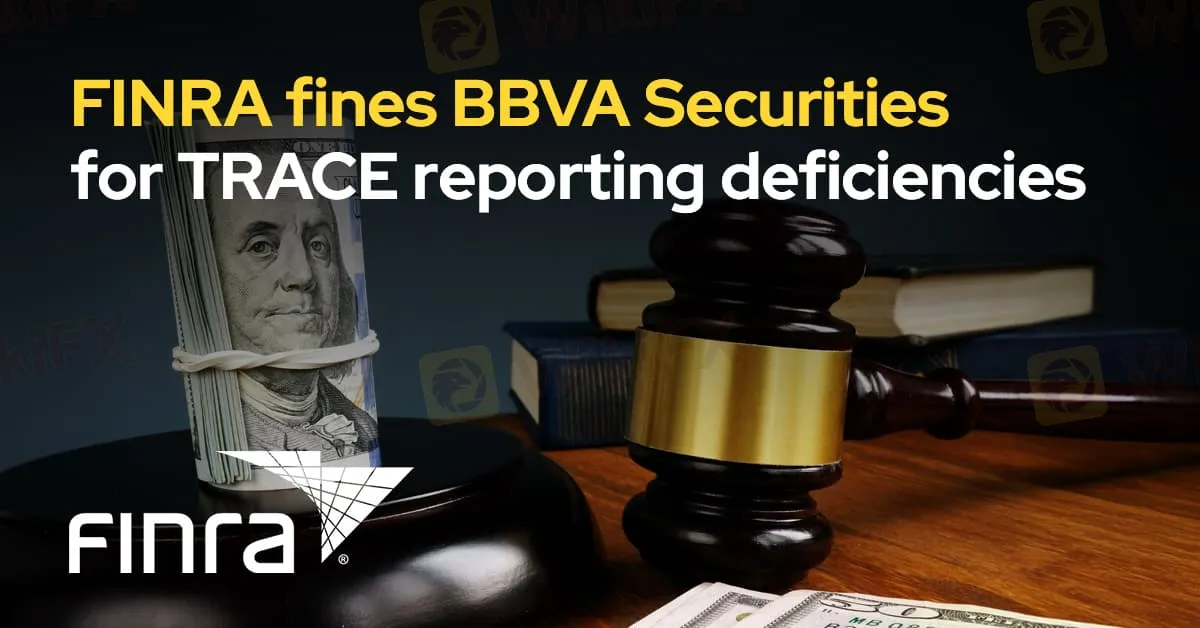简体中文
繁體中文
English
Pусский
日本語
ภาษาไทย
Tiếng Việt
Bahasa Indonesia
Español
हिन्दी
Filippiiniläinen
Français
Deutsch
Português
Türkçe
한국어
العربية
FINRA Fines BBVA Securities for TRACE Reporting Deficiencies
Abstract:BBVA Securities Inc. has been fined $175,000 by the Financial Industry Regulatory Authority (FINRA) as part of a settlement over deficiencies in its Trade Reporting and Compliance Engine (TRACE) reporting. The penalty comes after an investigation revealed significant lapses in BBVA's compliance with FINRA's reporting requirements.

BBVA Securities Inc. has been fined $175,000 by the Financial Industry Regulatory Authority (FINRA) as part of a settlement over deficiencies in its Trade Reporting and Compliance Engine (TRACE) reporting. The penalty comes after an investigation revealed significant lapses in BBVA's compliance with FINRA's reporting requirements.
Between July 2016 and January 2023, BBVA Securities failed to include a required indicator on approximately 50,000 TRACE reports. This omission was a direct violation of FINRA Rule 6730, which mandates the inclusion of specific indicators to ensure accurate and complete trade reporting.
The investigation also uncovered that BBVA Securities had not established or maintained a supervisory system adequate to ensure compliance with TRACE reporting requirements. This failure included a lack of effective written supervisory procedures designed to meet the standards outlined in FINRA Rule 6730.
Moreover, BBVA Securities did not review its TRACE reports for accuracy, which would have included verifying the presence of required indicators. This oversight resulted in violations of FINRA Rules 3110 and 2010, which mandate proper supervisory systems and adherence to regulatory requirements.
In addition to the $175,000 fine, BBVA Securities has agreed to a censure as part of the settlement. The censure serves as an official reprimand and a formal acknowledgment of the firm's regulatory shortcomings.
This settlement underscores the importance of robust supervisory systems and accurate trade reporting. FINRA's action highlights the need for financial firms to adhere strictly to reporting requirements and maintain effective compliance practices to avoid significant penalties.

Disclaimer:
The views in this article only represent the author's personal views, and do not constitute investment advice on this platform. This platform does not guarantee the accuracy, completeness and timeliness of the information in the article, and will not be liable for any loss caused by the use of or reliance on the information in the article.
Read more

The Ultimate Guide to Automated Forex Trading in 2025
Modern markets are revolutionized by automated trading systems, which now execute 70-85% of all transactions. These advanced automated trading software solutions, commonly called trading robots or Expert Advisors (EAs), leverage algorithmic precision for automatic trading across forex, stocks, and commodities 24/7. By removing emotional interference and executing trades in microseconds, auto forex trading platforms create fair opportunities for all market participants. For those new to automated trading for beginners, these systems provide disciplined, backtested strategies while significantly reducing manual effort.

Will natural disasters have an impact on the forex market?
The forex market is known for its rapid responses to global events, but the influence of natural disasters, such as earthquakes and typhoons, can be less straightforward. While headlines may scream about catastrophic damage and economic disruption, the long-term effects on currency values often depend on a blend of immediate shock and underlying economic fundamentals.

How Reliable Are AI Forex Trading Signals From Regulated Brokers?
Discover how reliable AI Forex trading signals are and why using a regulated broker boosts their effectiveness. Learn key factors to evaluate accuracy and enhance your trading.

Top Currency Pairs to Watch for Profit This Week - March 31, 2025
Discover the top 5 currency pairs to trade for profit this week, March 31, 2025—USD/JPY, EUR/USD, GBP/USD, AUD/USD, USD/CHF—with simple strategies and best times.
WikiFX Broker
Latest News
How Crypto Trading Transforms FX and CFD Brokerage Industry
UK would not hesitate to retaliate against US tariffs - No 10 sources
FCA Warns Against 10 Unlicensed or Clone Firms
CySEC Warns Against 14 Unlicensed Investment Websites
Top Currency Pairs to Watch for Profit This Week - March 31, 2025
Will natural disasters have an impact on the forex market?
Philippines Deports 29 Indonesians Linked to Online Scam Syndicate in Manila
Navigating the Intersection of Forex Markets, AI Technology, and Fintech
Exposed: Deceptive World of Fake Trading Gurus – Don’t Get Fooled!
AI-Powered Strategies to Improve Profits in Forex Trading
Currency Calculator







